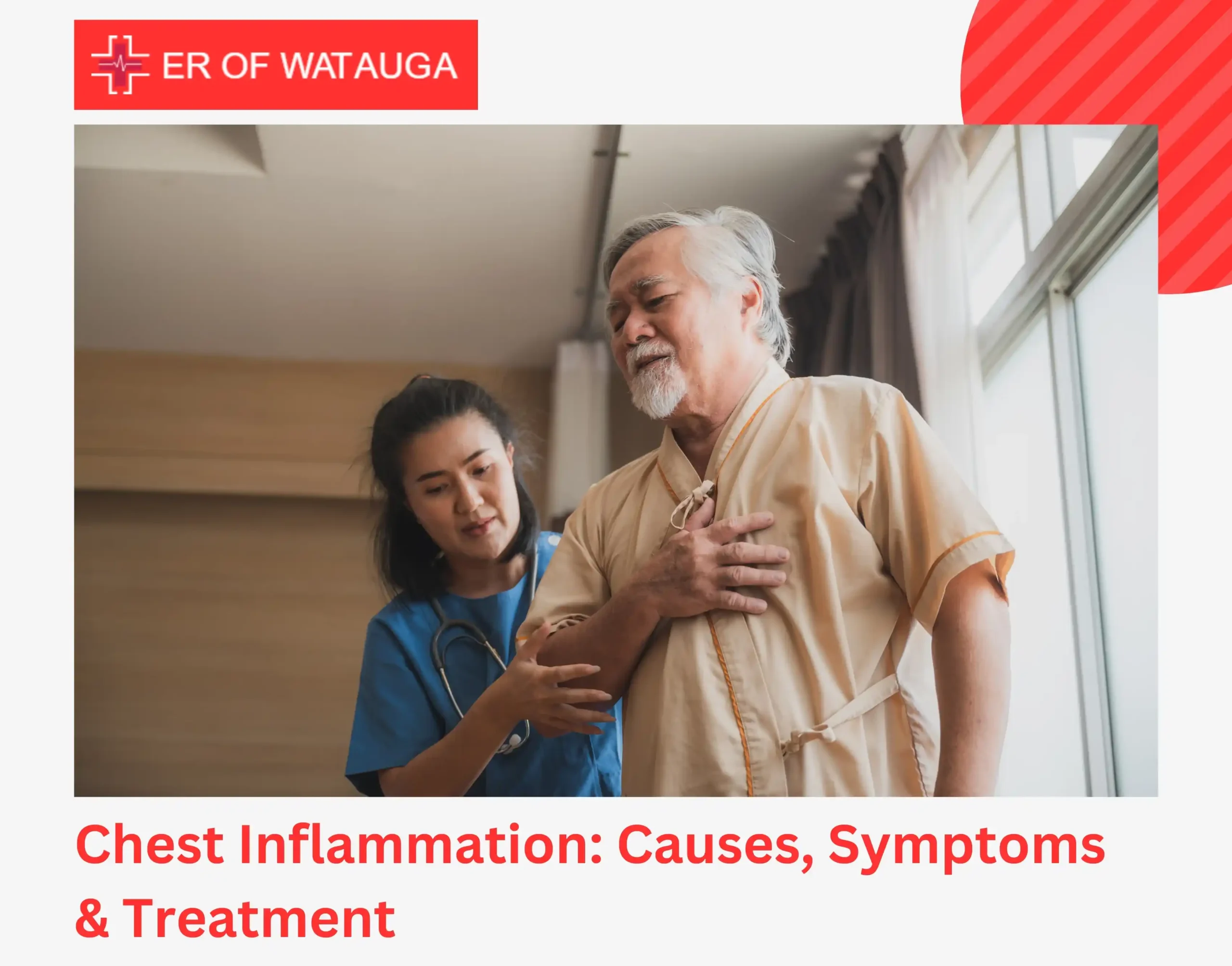Many people delay getting help for chest inflammation, thinking it’s just simple heartburn or a pulled muscle. But it could be the inflammation of your heart lining that mimics chest pain. If left untreated, it builds up fluid around the heart and turns into a life-threatening condition.
Inflammation in the chest can also be an early sign of a blood clot in the lungs, which can be fatal if not caught in time. If you know the causes, symptoms, and treatment of chest inflammation, you can make better choices about your health.
It helps you catch problems early, avoid longer recovery, and save money by preventing a wrong diagnosis. So, let’s look at how chest inflammation feels, especially when it’s a sign of something more serious.
What Is Chest Inflammation?
Chest inflammation happens when something irritates, infects, or injures the tissues inside your chest. The body sends white blood cells and chemicals to the infected area to fight or fix the problem causing inflammation. This inflammation can affect various components in the chest including
- Pleura: The thin membranes surrounding the lungs
- Pericardium: The sac-like covering of the heart.
- Myocardium: The heart muscle
- Costal Cartilage: The cartilage connecting the ribs to the breastbone
- Bronchial Tubes: The air passages within the lungs
So the common examples of chest inflammation are:
- Pleurisy (inflammation of the lung lining)
- Pericarditis (inflammation of the heart lining)
- Costochondritis (inflammation of rib cartilage)
- Myocarditis (inflammation of the heart muscle)
- Bronchitis (Inflammation of the bronchial tubes in the lungs)
- Pneumonitis (Inflammation of lung tissue)
What Causes Chest Inflammation?
It can happen for many reasons. Some are temporary and minor, while others are more serious. Here are some of the most common chest pain causes:
1. Infections
- Viral infections like the flu or COVID-19 can cause pleurisy, bronchitis, or myocarditis.
- Bacterial infections like pneumonia or tuberculosis can trigger inflammation in the chest.
- Fungal or parasitic infections, although less common, can inflame lung tissues in people with weakened immune systems.
2. Autoimmune Conditions
In autoimmune conditions, the immune system mistakenly attacks healthy tissues in the chest and causes inflammation. Common autoimmune diseases like lupus, rheumatoid arthritis, or vasculitis inflame the lungs, heart lining, or blood vessels in the chest.
3. Chest Injury or Strain
Trauma like a fall, car accident, or heavy coughing can irritate the chest wall. It can lead to costochondritis, a painful but usually harmless inflammation of the rib cartilage. Broken ribs or muscle strain can cause swelling and inflammation in nearby tissues.
4. Cancer or Tumors
Though less common, tumors in the lungs or chest wall can cause inflammation and pain.
5. GERD (Gastroesophageal Reflux Disease)
GERD can indirectly cause chest inflammation by allowing stomach acid to flow back (reflux) into the esophagus. This repeated acid exposure inflames the esophagus and nearby chest structures.
6. Environmental Irritants
Breathing in smoke, chemicals, or pollution can inflame the airways or lung tissues. This is more common in people with asthma or COPD (chronic obstructive pulmonary disease).
7. Radiation or Certain Medications
People undergoing cancer treatments like radiation or taking certain medications (especially chemotherapy drugs) may develop chest inflammation as a side effect. This can affect the heart (myocarditis), lungs, or surrounding tissues.
What Are the Symptoms of Chest Inflammation
Because the chest contains several vital organs and structures, the symptoms of inflammation can vary greatly depending on what’s affected. Here’s a breakdown of common symptoms by type:
General Symptoms:
- Chest tightness or pain
- Trouble breathing deeply
- Tenderness when touching or pressing the chest
- Sharp or stabbing pain that worsens with movement or breathing
Pleurisy Symptoms:
- Sharp pain when breathing, coughing, or sneezing
- Pain that improves when you hold your breath
Costochondritis Symptoms:
- Localized pain near the breastbone
- Pain that worsens when you press on the ribs
Myocarditis or Pericarditis Symptoms:
- Chest pain (often dull)
- Fatigue
- Shortness of breath
- Irregular heartbeat or palpitations
- Fever (in some cases)
Bronchitis or Pneumonitis Symptoms:
- Cough (dry or productive)
- Chest congestion
- Shortness of breath
- Low-grade fever or chills
Important Note: Some of these symptoms, like chest pain, shortness of breath, and irregular heartbeat, can also be signs of a heart attack. If unsure, it’s always safer to seek emergency care.
How Is Chest Inflammation Diagnosed?
Your doctor will ask about your symptoms, medical history, and recent illnesses or injuries. From there, they may run tests such as:
- Chest X-ray or CT scan – To spot inflammation in the lungs, ribs, or heart lining.
- Electrocardiogram (EKG) – To rule out heart-related causes.
- Blood tests – To check for infection or autoimmune markers.
- Echocardiogram – An ultrasound of the heart to look for pericarditis or myocarditis.
- Pulmonary function tests – To see how well your lungs are working.
These tools help zero in on the cause and determine how serious the inflammation is.
How Is Chest Inflammation Treated?
Chest inflammation treatment depends on what’s causing the inflammation. Here’s a general idea of how it’s managed:
Medications
You get the medication depending on what’s causing your chest inflammation.
For an infection (like pneumonia, bronchitis, or myocarditis)
- Antibiotics (for bacterial infections)
- Antivirals (sometimes, for viral infections)
- IV fluids and oxygen if breathing is affected
- Pain relievers or anti-inflammatories
For an inflammation without infection (like costochondritis or pleurisy):
- NSAIDs (like ibuprofen) to reduce inflammation and pain
- Muscle relaxers if there’s chest wall tension
- Steroids in more severe or autoimmune-related cases
If it’s related to an autoimmune disease:
- You may be given steroids or referred to a specialist
- Ongoing care may involve rheumatology
If it’s related to GERD (acid reflux):
- Antacids or acid reducers
- Lifestyle advice and possibly a referral for follow-up care
Hospital Admission
If inflammation in the chest is affecting your breathing and heart, or doesn’t respond to initial treatment, the ER will refer you to the hospital for more advanced care.
Final Thoughts
Our chest houses some of the most vital organs in the body. If you ever feel the above-mentioned symptoms, get yourself checked out before it turns into an emergency.
The board-certified physicians at ER Watauga quickly diagnose the cause of your chest inflammation using their onsite lab facility. Whether it turns out to be mild inflammation or an urgent health issue, you’ll get clarity and peace of mind. We make sure you focus on healing, not worrying.
FAQs
1. Can chest inflammation feel like a heart attack?
Yes, some types like pericarditis or costochondritis can mimic heart attack symptoms. An ER visit can rule out heart problems and pinpoint what’s going on.
2. Can chest inflammation go away on its own?
Sometimes, mild cases like costochondritis may ease with rest and over-the-counter medicines. But if it’s caused by an infection, or autoimmune issue, or involves your heart or lungs, you’ll need proper treatment.
3. Is chest inflammation contagious?
Only if it’s caused by an infectious illness like the flu, COVID-19, or pneumonia. In these cases, the virus or bacteria is contagious, but not the inflammation itself. Other causes, like autoimmune issues or injury, are not contagious.
4. Should I go to the ER or wait to see my doctor?
If you have chest pain that’s sudden, severe, or paired with shortness of breath, fever, or irregular heartbeat go to the ER. It’s not worth waiting, especially when it could be a heart or lung issue.









